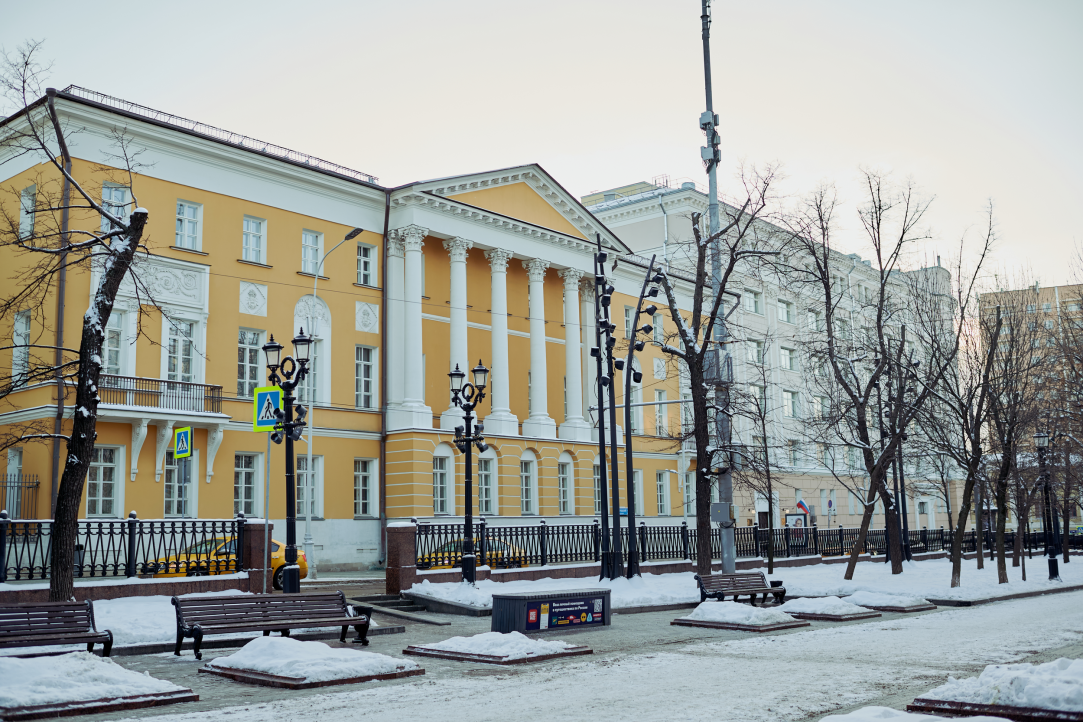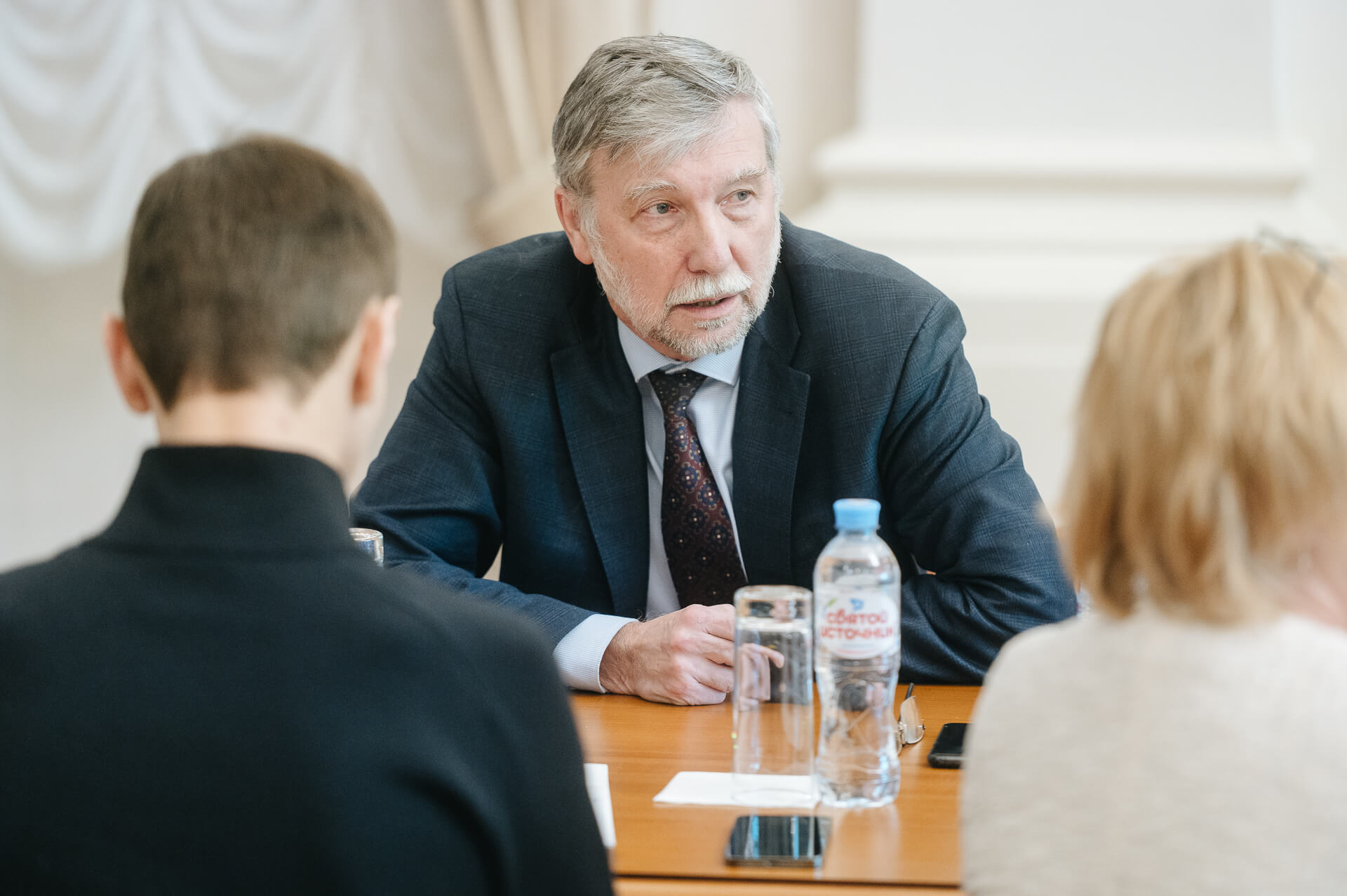‘University Life in Partnership with Artificial Intelligence’

HSE University is one of the leaders in IT education and research in the field of artificial intelligence (AI). Thanks to this, the university recently received the highest grant of the Priority 2030 programme. The integration of AI technologies into education is set to become a strategic direction for the university’s development over the next five years. What changes are coming to HSE University in this regard and how they will affect students and teachers? These issues were discussed at a meeting of HSE University’s Academic Council on December 20.
At the beginning of the meeting, HSE University Rector Nikita Anisimov noted that the university had proven its leading position in the first group of the ‘Research Leadership’ area of the Priority 2030 programme and received the largest grant.
He outlined and commented on eight points characterising HSE University’s development in 2023, which formed the basis of his report at the meeting of the Programme Council:
connecting social and humanitarian knowledge with digital sciences
capitalisation of accumulated scientific potential
creating human-oriented technologies through strategic projects
maintaining high standards of education quality
youth development for the country’s sustainable future
development of the management system to ensure the university’s sustainability
ensuring a contribution to supporting youth and the development of education and science in Russia’s regions
maintaining the position of a world-class national research university in the new geopolitical conditions

One of the Priority 2030 Council’s recommendations was to focus more on AI technologies for people. ‘In conditions where no one has any doubts about the role and value of artificial intelligence technologies for the further existence of humanity, we need to understand how it will become part of our large community’s life,’ said Nikita Anisimov.

As Yaroslav Kuzminov, HSE University’s Academic Supervisor, emphasised, ‘HSE University is practically the only university that has retained the scale of financial support from previous years due to the fact that we acted impeccably in cooperation with the Ministry of Digital Development of Russia by participating in the Digital Departments project.’
HSE University’s Vice Rector Sergey Roshchin gave a report on AI, the main item on the meeting agenda.
According to him, the university realised earlier than others that everyone should have digital competencies, and today HSE University is virtually an information technology university. The number of bachelor’s and master’s programmes that are in one way or another related to computer science is larger than the number of programmes in economics and management.

Sergey Roshchin suggested treating existing achievements as prerequisites for further development. ‘There is quite a serious turn ahead,’ he said.
In the near future, they plan to update the Data Culture project, under which all students of bachelor’s programmes will receive digital competencies. One component of the project will be changed this academic year as an experiment, then next year systematically. Students will have to study data analysis, methods of working with AI, and generative models in various fields—from design and Asian studies to management and law.
The developments of the Data Culture project will be transferred to a major (part of the main educational programme that forms the knowledge system in the main area of training), where courses related to the use of AI will appear. According to Sergey Roshchin, only 5% of disciplines currently cover interaction with various elements of AI.
The space of programmes whose graduates have subject and instrumental competencies and can apply these competencies in the selected subject areas will expand. There are already many such programmes at the master’s and bachelor’s levels, such as Computational Social Sciences.
Generative models should become part of students’ learning toolset—they can be used in projects, coursework, and graduation papers. In addition, students will have the opportunity to take part in projects to test technologies for identifying generative models.
Updating the skills, abilities, and competencies of teachers is another large-scale task which will allow the university to remain competitive. ‘2024 should be a year of large-scale retraining of teaching staff,’ concluded Sergey Roshchin.
Artificial intelligence should also be utilised to assist teachers by performing routine tasks. For example, an AI evaluator is being developed based on an array of data from independent exams within the framework of the Linguatest certification testing system implemented by HSE University.
According to the speaker, HSE University should become a university where artificial intelligence permeates all subject areas. The university’s online campus has already engaged in reworking all AI-related aspects, and this work needs to be implemented at the four traditional campuses as well.
There is also an ethical aspect of using AI in the educational process. Sergey Roshchin proposed the formulation of an ethical code within HSE University, which will be the first regulation of how different participants in the educational process interact with AI.
Commenting on the report, Nikita Anisimov noted that the discussion is about a very serious area in which ‘we take responsibility not just for the introduction of education in the field of artificial intelligence at the university, but for the life of the university in partnership with artificial intelligence.’
See also:
HSE Scientists Optimise Training of Generative Flow Networks
Researchers at the HSE Faculty of Computer Science have optimised the training method for generative flow neural networks to handle unstructured tasks, which could make the search for new drugs more efficient. The results of their work were presented at ICLR 2025, one of the world’s leading conferences on machine learning. The paper is available at Arxiv.org.
Neural Network Trained to Predict Crises in Russian Stock Market
Economists from HSE University have developed a neural network model that can predict the onset of a short-term stock market crisis with over 83% accuracy, one day in advance. The model performs well even on complex, imbalanced data and incorporates not only economic indicators but also investor sentiment. The paper by Tamara Teplova, Maksim Fayzulin, and Aleksei Kurkin from the Centre for Financial Research and Data Analytics at the HSE Faculty of Economic Sciences has been published in Socio-Economic Planning Sciences.
Larger Groups of Students Use AI More Effectively in Learning
Researchers at the Institute of Education and the Faculty of Economic Sciences at HSE University have studied what factors determine the success of student group projects when they are completed with the help of artificial intelligence (AI). Their findings suggest that, in addition to the knowledge level of the team members, the size of the group also plays a significant role—the larger it is, the more efficient the process becomes. The study was published in Innovations in Education and Teaching International.
Advancing Personalised Therapy for More Effective Cancer Treatment
Researchers from the International Laboratory of Microphysiological Systems at HSE University's Faculty of Biology and Biotechnology are developing methods to reduce tumour cell resistance to drugs and to create more effective, personalised cancer treatments. In this interview with the HSE News Service, Diana Maltseva, Head of the Laboratory, talks about their work.
Master’s Students of HSE, University of Campinas, and Tsinghua University Publish Joint Student Research Collection
Master’s students of the HSE ISSEK programme ‘Science, Technology and Innovation Management and Policy’ have released a joint research collection with the University of Campinas (Brazil) and Tsinghua University (China) titled ‘Being Innovative or Being on the Safe Side—Managing the Risk of Failure.’ The authors explore how organisations perceive risks and embrace innovation within different cultural contexts.
‘A Turn Away from Stereotypes’: Moscow Hosts ‘Researching the Deaf Community’ Conference
On October 17–19, 2025, the third annual interdisciplinary conference ‘Researching the Deaf Community 2025: on the Periphery of Attention’ took place at GES-2 House of Culture in Moscow. The event was organised with the participation of the HSE International Laboratory for Social Integration Research. HSE University Vice Rector Irina Martusevich addressed attendees at the opening ceremony.
Exploring the Mind: HSE Scientists Discuss Cognitive Technologies of the Future
Why we make irrational decisions, how the brain responds to fakes, and whether neural networks are capable of thinking—these were the topics discussed by early-career scientists of HSE University during the NAUKA 0+ science festival. The event brought together students and experts from various fields, united by a common goal—to deepen their understanding of the human brain and cognitive technologies.
HSE Researchers Assess Creative Industry Losses from Use of GenAI
Speaking at the IPQuorum.Music forum on October 15, Leonid Gokhberg, HSE First Vice Rector, and Daniil Kudrin, an expert at the Centre for Industry and Corporate Projects of HSE ISSEK, presented the findings of the first study in Russia on the economic impact of GenAI on creative professions. The analysis shows that creators’ potential losses could reach one trillion roubles by 2030.
International Dialogue on Urban Development: Dynamic Urbanism and Green Infrastructure
In September 2025, the HSE Faculty of Urban and Regional Development (FURD) hosted a delegation of leading scholars and urban development experts from China. Two seminars were held at the Shukhov Lab with the participation of Chinese colleagues: the first focused on green infrastructure, while the second explored the theme of dynamic urbanism. In addition, a meeting between the Chinese delegation and representatives of FURD took place at the university’s main building on Pokrovsky Bulvar. The participants discussed opportunities for expanding cooperation between universities and research centres.
HSE Tops the Ranking of Universities with the Best Employer Reputation
On October 16, 2025, Forbes Education published its list of the top 20 Russian universities with the best employer reputation in 2025. The ranking was based on a survey of leading Russian employers, who named the higher education institutions whose graduates they consider the most well-prepared and are most inclined to hire. HSE University took first place in the ranking.


